Intro
Identify signs of stress, anxiety symptoms, and emotional exhaustion. Learn coping mechanisms and stress management techniques to alleviate mental health issues.
Stress is a natural part of life, and it can affect anyone, regardless of their background or circumstances. It's a normal response to a situation that feels overwhelming or threatening, and it can manifest in many different ways. Some people may experience physical symptoms, such as headaches or stomach problems, while others may feel emotional or psychological effects, such as anxiety or irritability. In today's fast-paced world, it's more important than ever to be aware of the signs of stress and to take steps to manage it effectively.
Stress can have a significant impact on both physical and mental health, and it's essential to recognize the warning signs before they escalate into more serious problems. Chronic stress can lead to a range of health issues, including high blood pressure, heart disease, and a weakened immune system. It can also affect relationships, work performance, and overall quality of life. By understanding the signs of stress and taking proactive steps to manage it, individuals can reduce their risk of developing these problems and improve their overall well-being.
The importance of recognizing and managing stress cannot be overstated. It's a critical aspect of maintaining good health, building strong relationships, and achieving success in all areas of life. By being aware of the signs of stress and taking steps to mitigate its effects, individuals can take control of their lives, improve their resilience, and develop the skills they need to thrive in today's demanding world. Whether it's through self-care, social support, or professional help, there are many effective ways to manage stress and reduce its negative impact.
Physical Signs Of Stress
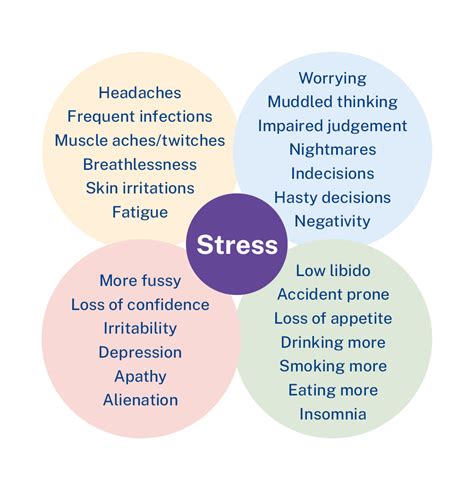
- Rapid heartbeat or palpitations
- Sweating or trembling
- Nausea or dizziness
- Fatigue or low energy
- Changes in blood pressure
These physical symptoms can be uncomfortable and even debilitating, but they can also serve as a warning sign that something needs to change. By recognizing these physical signs of stress, individuals can take the first step towards managing their stress and improving their overall health.
Causes Of Physical Stress
Physical stress can be caused by a range of factors, including work-related issues, financial problems, and relationship conflicts. Other causes of physical stress include:- Lack of sleep or poor sleep quality
- Poor nutrition or dehydration
- Lack of exercise or physical activity
- Chronic illness or pain
- Trauma or abuse
Understanding the causes of physical stress can help individuals develop effective strategies for managing their stress and reducing its negative impact. By addressing the underlying causes of physical stress, individuals can take the first step towards improving their overall health and well-being.
Emotional Signs Of Stress
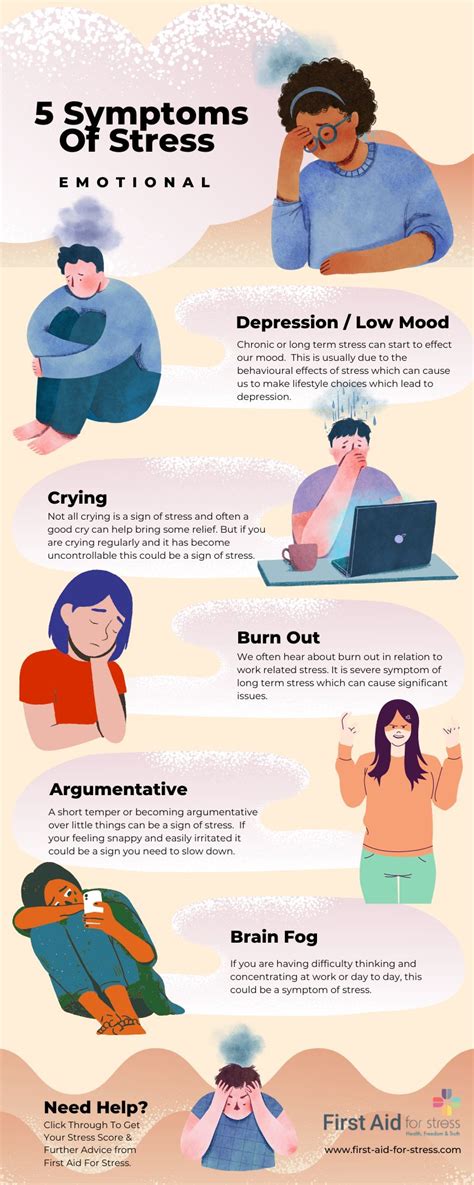
- Anxiety or feelings of overwhelm
- Irritability or mood swings
- Depression or sadness
- Loss of motivation or interest in activities
- Feeling isolated or disconnected from others
These emotional signs of stress can be challenging to manage, but there are many effective strategies that can help. By recognizing these emotional signs of stress, individuals can take the first step towards developing the skills they need to manage their stress and improve their mental health.
Managing Emotional Stress
Managing emotional stress requires a range of skills and strategies, including self-care, social support, and stress-reducing techniques. Some effective ways to manage emotional stress include:- Practicing mindfulness or meditation
- Engaging in physical activity or exercise
- Connecting with friends or family members
- Seeking professional help or therapy
- Engaging in hobbies or creative activities
By developing these skills and strategies, individuals can reduce their emotional stress and improve their overall mental health. Whether it's through self-care, social support, or professional help, there are many effective ways to manage emotional stress and improve overall well-being.
Cognitive Signs Of Stress
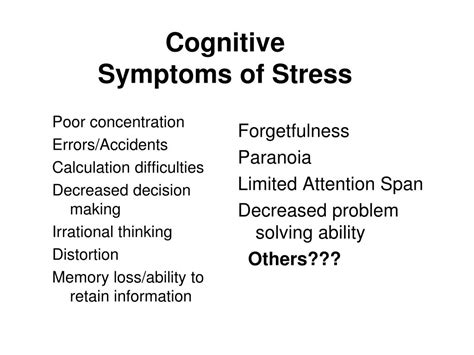
- Difficulty concentrating or focusing
- Memory problems or forgetfulness
- Difficulty making decisions or feeling indecisive
- Feeling overwhelmed or unable to prioritize tasks
- Ruminating or dwelling on negative thoughts
These cognitive signs of stress can be challenging to manage, but there are many effective strategies that can help. By recognizing these cognitive signs of stress, individuals can take the first step towards developing the skills they need to manage their stress and improve their cognitive function.
Improving Cognitive Function
Improving cognitive function requires a range of skills and strategies, including stress-reducing techniques, self-care, and cognitive training. Some effective ways to improve cognitive function include:- Practicing mindfulness or meditation
- Engaging in physical activity or exercise
- Getting enough sleep or practicing good sleep hygiene
- Engaging in cognitively stimulating activities, such as reading or puzzles
- Seeking professional help or therapy
By developing these skills and strategies, individuals can reduce their cognitive stress and improve their overall cognitive function. Whether it's through self-care, social support, or professional help, there are many effective ways to manage cognitive stress and improve overall well-being.
Behavioral Signs Of Stress
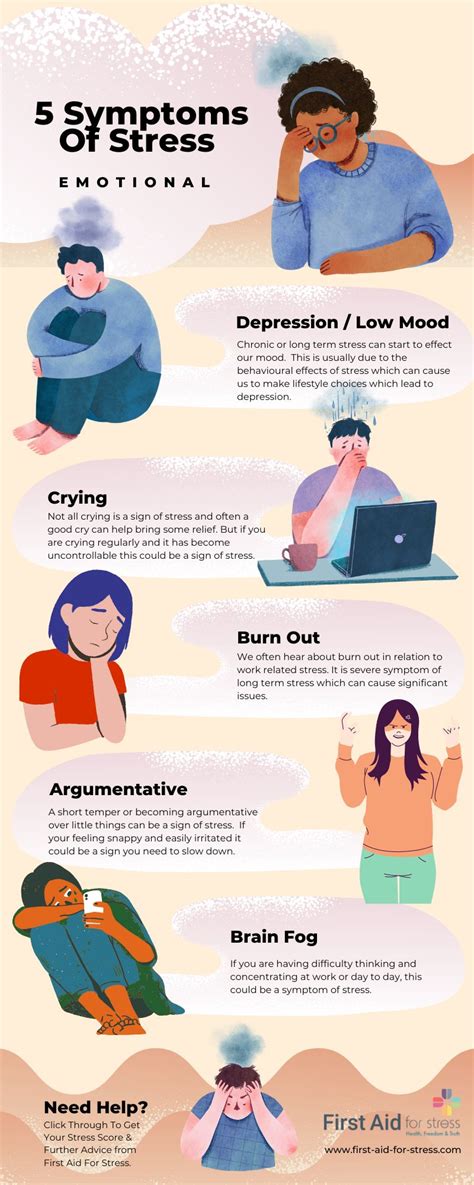
- Withdrawal or avoidance of social situations
- Increased use of substances, such as alcohol or drugs
- Changes in appetite or eating habits
- Increased irritability or mood swings
- Engaging in risky or impulsive behaviors
These behavioral signs of stress can be challenging to manage, but there are many effective strategies that can help. By recognizing these behavioral signs of stress, individuals can take the first step towards developing the skills they need to manage their stress and improve their overall well-being.
Managing Behavioral Stress
Managing behavioral stress requires a range of skills and strategies, including self-care, social support, and stress-reducing techniques. Some effective ways to manage behavioral stress include:- Practicing self-care, such as exercise or meditation
- Connecting with friends or family members
- Seeking professional help or therapy
- Engaging in hobbies or creative activities
- Setting boundaries or prioritizing tasks
By developing these skills and strategies, individuals can reduce their behavioral stress and improve their overall well-being. Whether it's through self-care, social support, or professional help, there are many effective ways to manage behavioral stress and improve overall quality of life.
Strategies For Managing Stress
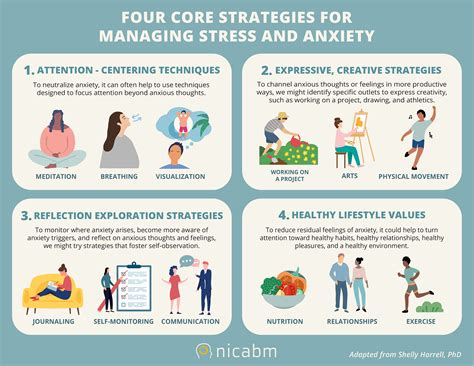
- Practicing mindfulness or meditation
- Engaging in physical activity or exercise
- Connecting with friends or family members
- Seeking professional help or therapy
- Engaging in hobbies or creative activities
By developing these skills and strategies, individuals can reduce their stress and improve their overall well-being. Whether it's through self-care, social support, or professional help, there are many effective ways to manage stress and improve overall quality of life.
Self-Care For Stress Management
Self-care is an essential aspect of stress management, and it can include a range of activities, such as exercise, meditation, or spending time in nature. Some effective self-care strategies for managing stress include:- Practicing yoga or tai chi
- Getting enough sleep or practicing good sleep hygiene
- Eating a healthy diet or practicing good nutrition
- Engaging in hobbies or creative activities
- Setting boundaries or prioritizing tasks
By incorporating these self-care strategies into daily life, individuals can reduce their stress and improve their overall well-being.
Conclusion And Next Steps

We invite you to share your thoughts and experiences with stress management in the comments below. What strategies have you found most effective in managing stress? What challenges have you faced, and how have you overcome them? By sharing your insights and experiences, you can help others who may be struggling with stress and improve overall well-being.
What are the most common signs of stress?
+The most common signs of stress include physical symptoms, such as headaches or stomach problems, emotional symptoms, such as anxiety or irritability, cognitive symptoms, such as difficulty concentrating or memory problems, and behavioral symptoms, such as withdrawal or increased use of substances.
How can I manage stress effectively?
+Effective stress management strategies include self-care, social support, and stress-reducing techniques, such as mindfulness or meditation, exercise, or spending time in nature. It's also essential to prioritize tasks, set boundaries, and seek professional help when needed.
What are the long-term effects of chronic stress?
+Chronic stress can have significant long-term effects on physical and mental health, including increased risk of heart disease, diabetes, and mental health disorders, such as anxiety or depression. It can also affect relationships, work performance, and overall quality of life.
How can I prioritize self-care for stress management?
+Prioritizing self-care for stress management involves making time for activities that bring joy and relaxation, such as exercise, meditation, or spending time in nature. It's also essential to get enough sleep, eat a healthy diet, and engage in activities that promote cognitive function and overall well-being.
What resources are available for stress management?
+Resources for stress management include online articles and guides, self-help books, support groups, and professional help from therapists or counselors. It's also essential to reach out to friends and family members for social support and connection.
